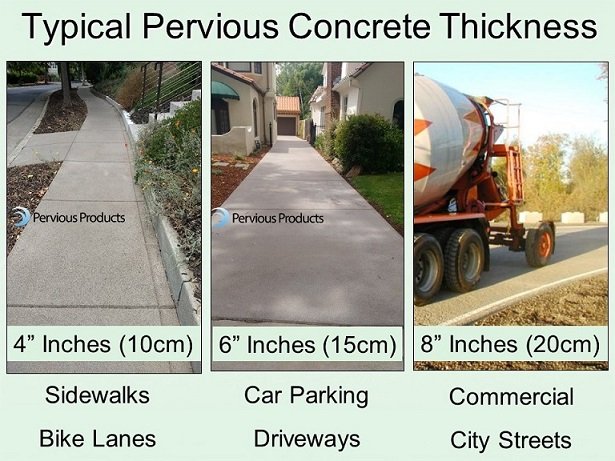For a durable driveway, the thickness of the concrete is crucial. So, how thick should concrete be for a driveway? The answer lies in finding the right balance between strength and cost-effectiveness. By understanding the factors that influence the ideal thickness, you can ensure that your driveway stands the test of time. Let’s delve into the specifics to guide you towards making the best decision for your driveway project.
How Thick Should Concrete Be for a Driveway
Welcome to our guide on choosing the right thickness for your concrete driveway! Whether you are planning to install a new driveway or renovate the existing one, getting the concrete thickness right is crucial for durability and longevity. In this article, we will dive into the details of how thick concrete should be for a driveway to ensure it can withstand daily use and weather conditions.
Understanding the Importance of Concrete Thickness
Before we delve into the recommended thickness for a concrete driveway, let’s understand why it matters. The thickness of the concrete plays a critical role in determining the strength and durability of the driveway. A properly constructed driveway with the right thickness can prevent cracking, sinking, and other forms of damage over time.
Factors Affecting Concrete Thickness
Several factors influence the required thickness of concrete for a driveway. These factors include the soil type, climate conditions, expected traffic load, and the overall design of the driveway. Understanding these factors will help you make an informed decision regarding the thickness of the concrete.
Soil Type
The type of soil underneath the driveway can impact the thickness of the concrete needed. For instance, clay soil may require thicker concrete to distribute the weight evenly and prevent cracking.
Climate Conditions
The climate in your region can also affect the required thickness of the concrete. Areas with extreme temperature variations may need thicker concrete to withstand freezing and thawing cycles without damage.
Traffic Load
The amount and type of traffic the driveway will experience play a significant role in determining the concrete thickness. Heavier vehicles will require thicker concrete to support their weight without cracking.
Design Considerations
The overall design of the driveway, including slope and drainage, can influence the required thickness of the concrete. Proper design ensures that the concrete is adequately supported and protected from water damage.
Recommended Concrete Thickness for Driveways
Now that we’ve covered the factors affecting concrete thickness, let’s discuss the recommended thickness for a standard residential driveway. In general, the minimum thickness for a concrete driveway should be at least 4 inches (10 centimeters). This thickness is suitable for light to moderate traffic and typical weather conditions.
For driveways that will experience heavier traffic, such as commercial properties or homes with multiple vehicles, a thickness of 6 inches (15 centimeters) or more is recommended. Thicker concrete provides additional strength and durability to withstand the increased load.
Ensuring Proper Installation
Regardless of the thickness chosen for your concrete driveway, proper installation is essential to ensure its longevity. Here are some tips to ensure a well-constructed driveway:
- Prepare the site properly by compacting the soil and providing adequate drainage.
- Use high-quality concrete mix with the right proportions of cement, aggregates, and water.
- Place and finish the concrete correctly to prevent cracks and ensure a smooth surface.
- Cure the concrete properly by keeping it moist for the required time to achieve maximum strength.
Choosing the right thickness for your concrete driveway is essential for its durability and longevity. By considering factors such as soil type, climate conditions, traffic load, and proper design, you can determine the ideal thickness for your specific needs. Remember that a well-constructed driveway with the right concrete thickness will not only enhance the curb appeal of your property but also provide years of reliable service.
How Thick Should Your Concrete be?
Frequently Asked Questions
What factors determine the proper thickness of concrete for a driveway?
The thickness of concrete for a driveway is determined by various factors such as the weight of vehicles expected to use it, soil conditions, and local climate. Typically, a residential driveway would require a thickness of at least 4 inches, while heavier vehicles or harsher conditions may require a thicker slab.
How does the weight of vehicles impact the thickness of concrete needed for a driveway?
The weight of vehicles using the driveway is a critical factor in determining the required thickness of the concrete. Heavier vehicles, such as trucks or RVs, exert more pressure on the concrete surface. To withstand this weight and prevent cracking, a thicker concrete slab, typically 6 inches or more, is recommended.
Can soil conditions affect the thickness of concrete necessary for a driveway?
Yes, soil conditions play a significant role in determining the proper thickness of concrete for a driveway. Poor soil quality, such as clay or expansive soils, can cause the ground to shift and potentially crack the concrete. In such cases, it is advisable to increase the thickness of the concrete to ensure stability and durability.
Why is it important to consider the local climate when determining the thickness of concrete for a driveway?
The local climate can impact the durability of a concrete driveway. In areas with freeze-thaw cycles, for example, the concrete needs to be thick enough to withstand the expansion and contraction that can occur due to temperature changes. A thicker concrete slab can help prevent cracking and prolong the lifespan of the driveway.
Are there any guidelines for ensuring the proper thickness of concrete for a driveway?
While specific guidelines may vary based on local building codes and conditions, a general rule of thumb is to use a minimum thickness of 4 inches for residential driveways. For heavier vehicles or challenging conditions, increasing the thickness to 6 inches or more is recommended. Consulting with a professional contractor can help determine the ideal thickness based on specific requirements and circumstances.
Final Thoughts
In conclusion, the ideal thickness for concrete driveways is 4 inches for regular passenger vehicles and 5 inches for heavier vehicles like trucks or RVs. Ensuring the proper thickness is crucial for durability and longevity. Remember, the thickness of the concrete for a driveway plays a significant role in its strength and ability to withstand daily wear and tear. Always consult with a professional to determine how thick should concrete be for a driveway.




